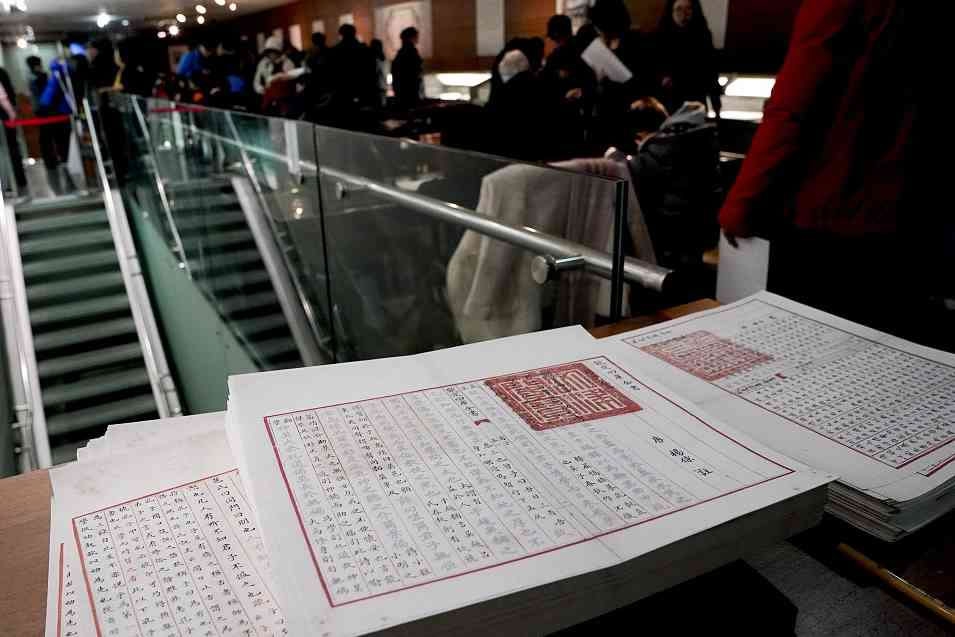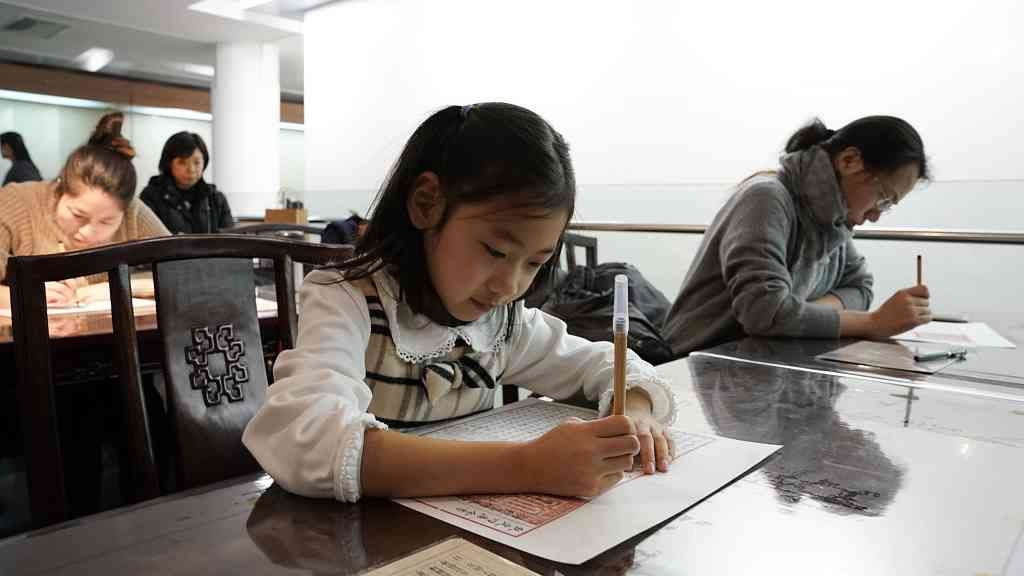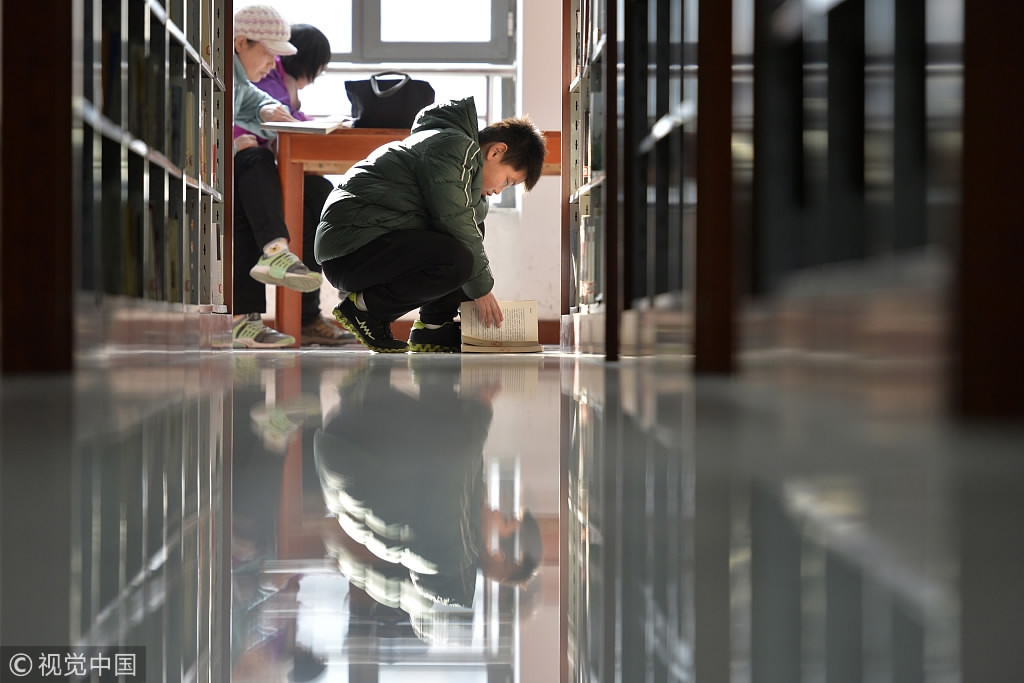
Opinions
17:13, 03-Jan-2018
Opinion: Why daily reading matters?
Guest commentary by Luke Shen-Tien Chi

Editor’s note
China's first public library law came into effect on January 1, requiring local government authorities to provide more reading spaces to the public through public libraries that offer ancient texts and modern technology and promote traditional Chinese culture.
Long ago, civilization shared stories through artistic imagery and verbal expressions that passed through generations into the modern era. Fossil stones imprinted with various landmarks gave clues as to how humans communicated over ancient periods. Oral communities also still exist to the present day in some parts of the world without the instructions of literacy.

An activity aiming at approaching the "Si Ku Quan Shu”, or “Complete Library in the Four Branches of Literature,” was held at Beijing National Library to celebrate the country's first public library law. / VCG Photo
An activity aiming at approaching the "Si Ku Quan Shu”, or “Complete Library in the Four Branches of Literature,” was held at Beijing National Library to celebrate the country's first public library law. / VCG Photo
During the Renaissance of the 12th century, Johannes Gutenberg invented the mechanical movable-type printing press that started the printing revolution, which opened the world to a new form of communication called print media. Local readers at the time were able to easily access news via available pamphlets.
Weekly news became widely available in urban cities and politicians made use of booklets for election campaigning. Oral storytelling is becoming more obsolete today, whereas small talks happen constantly each day over wireless communication technology.
Printing books was popular for hundreds of years, protecting many great classics from decaying. Yet, the best printed masterpieces of the past are not in major demand as electronic books have become more accessible. Nevertheless, some traditional book suppliers have turned a new page by engaging in trendy 24-hour operations.

An activity aiming at approaching the "Si Ku Quan Shu” or "Complete Library in the Four Branches of Literature,” was held at Beijing National Library to celebrate the country's first public library law. / VCG Photo
An activity aiming at approaching the "Si Ku Quan Shu” or "Complete Library in the Four Branches of Literature,” was held at Beijing National Library to celebrate the country's first public library law. / VCG Photo
China now has retail outlets catering to consumers with different tastes in reading atmosphere. This fresh alternative approach has broken through the old marketing strategy and focuses on a reading-friendly environment.
Looking back, visual communication was quite a good upbringing for children growing up in the United States. American lawmakers passed the “Children’s Television Act” in the 1990s. It protected the interests of children and continued to promote educational television programs for children. I recalled a half-hour children’s television series called “Reading Rainbow” that encouraged children to read more often. In particular, the program’s subtitle caught my attention: “Opening books, Opening minds.”
Present-day information is always close at hand. Setting aside quiet moments to enjoy a period of unlimited reading mostly happens when a person has prior self-willingness. This continual desire for reading will take anyone into unimaginable horizons.

Four types of services at public libraries in China will be free starting January 1, 2018. /VCG Photo
Four types of services at public libraries in China will be free starting January 1, 2018. /VCG Photo
The 24th Beijing International Book Fair last August attracted many audiences, with a particular focus on politics in China. President Xi Jinping’s work is the most favored choice among other writers. “The Governance of China” gives us a fresh perspective of Xi’s ideas and it is highly recommended for everyone to read the masterpiece behind today’s political thought.
Chinese mainland online shoppers are actively strong, especially those who were born in the 1980s. For others, the Internet is a convenient way to avoid unpleasant weather conditions. Popular bookstores have been offering more side attractions to youngsters, such as the opportunity to purchase refreshments or other non-book related products.
Some universities had challenged the viewpoint that you had to provide amusement to keep readers active by redesigning or refurbishing existing libraries with new methods of relaxation that promote reading. For instance, Nanjing University of Science and Technology offers a whole range of newly designed concepts for modern libraries.
When it comes to reading there should be no compromises pertaining to the benefits a person will receive. All other enhancements are just extra additions. The central focus of reading is to encourage growing minds to produce intellectual communities that will help achieve the Chinese Dream. Furthermore, knowledge gained with distinction is the key to building the future in both science and innovation.

An underground library in a residential community in Beijing. / VCG Photo
An underground library in a residential community in Beijing. / VCG Photo
When it comes to international assessment, Finland places first in academic testing. The secret to the success is the endless family reading time. That serves as part of the regular pattern of life. Certain Chinese universities are extremely persistent in advocating that students participate in morning reading. Some argue that this sort of exercise brings about a significant amount of tiredness. Yet we know that perseverance with hard work will bring forth greater results for many.
Thus good health for our growing thoughts is to keep stretching ours mind to the utmost. Perhaps you’re looking for a new resolution; I sincerely hope you will consider reading as one of your priorities since you never know what you will uncover beneath the authors’ written communication. My mentor once said, “A good book is like a good train that takes us on a good journey.” Wishing you, the reader, a happy New Year.
(The author is a Chinese American, English "spokenologist" at Shenyang Normal University. The article reflects the author’s opinion, and not necessarily the views of CGTN.)

SITEMAP
Copyright © 2018 CGTN. Beijing ICP prepared NO.16065310-3
Copyright © 2018 CGTN. Beijing ICP prepared NO.16065310-3